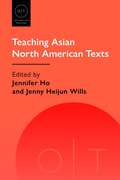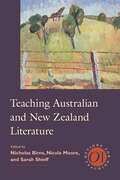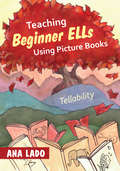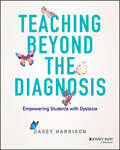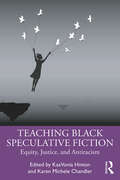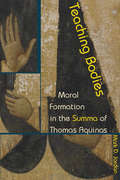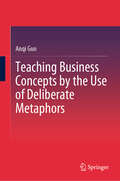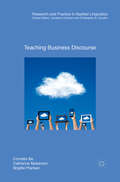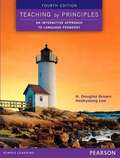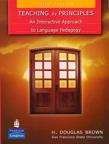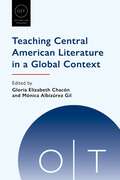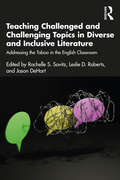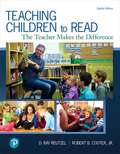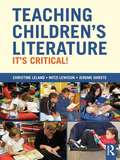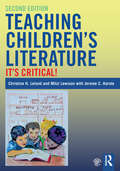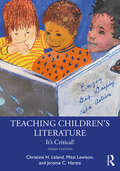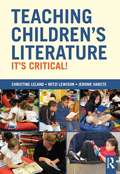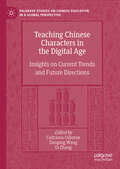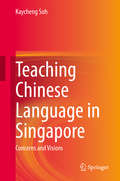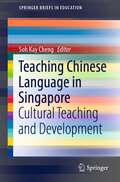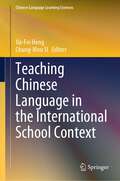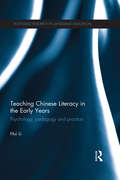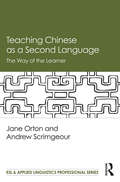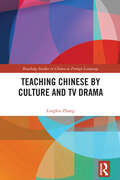- Table View
- List View
Teaching Asian North American Texts (Options for Teaching #57)
by Jennifer Ho and Jenny Heijun WillsFrom the short stories and journalism of Sui Sin Far to Maxine Hong Kingston's pathbreaking The Woman Warrior to recent popular and critical successes such as Viet Thanh Nguyen's The Sympathizer, Mohsin Hamid's The Reluctant Fundamentalist, and Kevin Kwan's Crazy Rich Asians, Asian North American literature and media encompass a long history and a diverse variety of genres and aesthetic approaches.The essays in this volume provide context for understanding the history of Asian immigrants to the United States and Canada and the experiences of their children, grandchildren, and great-grandchildren. Contributors address historical contexts, from the early enactment of Asian exclusion laws to the xenophobia following 9/11, and provide tools for textual analysis. The essays explore conventionally literary texts, genres such as mystery and speculative fiction, historical documents and legal texts, and visual media including films, photography, and graphic novels, emphasizing the ways that creators have crossed boundaries of genre and produced innovative new forms.
Teaching Australian and New Zealand Literature (Options for Teaching #40)
by Nicholas Birns Nicole Moore Sarah ShieffAustralia and New Zealand, united geographically by their location in the South Pacific and linguistically by their English-speaking inhabitants, share the strong bond of hope for cultural diversity and social equality--one often challenged by history, starting with the appropriation of land from their Indigenous peoples. This volume explores significant themes and topics in Australian and New Zealand literature. In their introduction, the editors address both the commonalities and differences between the two nations' literatures by considering literary and historical contexts and by making nuanced connections between the global and the local. Contributors share their experiences teaching literature on the iconic landscape and ecological fragility; stories and perspectives of convicts, migrants, and refugees; and Maori and Aboriginal texts, which add much to the transnational turn.This volume presents a wide array of writers--such as Patrick White, Janet Frame, Katherine Mansfield, Frank Sargeson, Witi Ihimaera, Christina Stead, Allen Curnow, David Malouf, Les Murray, Nam Le, Miles Franklin, Kim Scott, and Sally Morgan--and offers pedagogical tools for teachers to consider issues that include colonial and racial violence, performance traditions, and the role of language and translation. Concluding with a list of resources, this volume serves to support new and experienced instructors alike.
Teaching Beginner ELLs Using Picture Books: Tellability
by Ana L. LadoPicture your beginning ELLs reading their way to success! For beginning ELLs, a picture really is worth a thousand words! Picture books are useful tools for building important language and social foundations that students may miss through traditional instruction. Ana Lado provides all the tools you’ll need to engage ELLs of any age with picture books, including how to: Design lessons around picture books Select appropriate titles using specific criteria Incorporate fun and engaging strategies like singing and reenacting Access the book’s searchable online database to find the right book Integrate picture-book learning to facilitate development of English Language Proficiency
Teaching Beyond the Diagnosis: Empowering Students with Dyslexia
by Casey HarrisonTips for tailoring instruction and meeting the needs of dyslexic learners Looking through both academic and social-emotional lenses, this book will deepen your understanding of dyslexia and help you feel confident in your interactions and implementation of instruction with your dyslexic learners. Written for educators and schools looking for ways to meet the social and emotional needs of dyslexic learners, scaffold instruction, and successfully implement accommodations, Teaching Beyond the Diagnosis provides a concrete framework for promoting self-confidence and student success. Author Casey Harrison, creator of The Dyslexia Classroom, shares her unique approach to creating dyslexia-friendly classrooms, providing accommodations and in the moment scaffolds as well as helping students build self-advocacy skills. This book will allow you to: Meet the needs of dyslexic learners both academically and emotionally Understand what dyslexia is, how it impacts learning, and what implications it has beyond the reading classroom Learn research-based techniques to enhance, differentiate and scaffold instruction, promoting learning in students with dyslexia Develop empathy and understanding, both in yourself and in the broader educational community, and promote inclusive classrooms This book is for anyone who wants to help students with dyslexia find self-confidence and success: K-12 educators, as well as parents, administrators, and aspiring teachers.
Teaching Bibliography, Textual Criticism and Book History
by Ann R. HawkinsOffers a variety of approaches to incorporating discussions of book history or print culture into graduate and undergraduate classrooms. This work considers the book as a literary, historical, cultural, and aesthetic object. These essays are of interest to university teachers incorporating textual studies and research methods into their courses.
Teaching Black Speculative Fiction: Equity, Justice, and Antiracism
by KaaVonia Hinton Karen Michele ChandlerTeaching Black Speculative Fiction: Equity, Justice, and Antiracism edited by KaaVonia Hinton and Karen Michele Chandler offers innovative approaches to teaching Black speculative fiction (e.g., science fiction, fantasy, horror) in ways that will inspire middle and high school students to think, talk, and write about issues of equity, justice, and antiracism. The book highlights texts by seminal authors such as Octavia E. Butler and influential and emerging authors, including Nnedi Okorafor, Kacen Callender, B. B. Alston, Tomi Adeyemi, and Bethany C. Morrow.Each chapter in Teaching Black Speculative Fiction: introduces a Black speculative text and its author, describes how the text engages with issues of equity, justice, and/or antiracism, explains and describes how one theory or approach helps elucidate the key text’s concern with equity, justice, and/or antiracism, and offers engaging teaching activities that encourage students to read the focal text; that facilitate exploration of the text and a theoretical lens or critical approach; and that guide students to consider ways to extend the focus on equity, justice, and/or antiracism to action in their own lives and communities.
Teaching Bodies: Moral Formation in the Summa of Thomas Aquinas
by Mark D. JordanIn Teaching Bodies, leading scholar of Christian thought Mark D. Jordan offers an original reading of the Summa of Theology of Thomas Aquinas. Reading backward, Jordan interprets the main parts of the Summa, starting from the conclusion, to reveal how Thomas teaches morals by directing attention to the way God teaches morals, namely through embodied scenes: the incarnation, the gospels, and the sacraments. It is Thomas’s confidence in bodily scenes of instruction that explains the often overlooked structure of the middle part of the Summa, which begins and ends with Christian revisions of classical exhortations of the human body as a pathway to the best human life. Among other things, Jordan argues, this explains Thomas’s interest in the stages of law and the limits of virtue as the engine of human life.Rather than offer a synthesis of Thomistic ethics, Jordan insists that we read Thomas as theology to discover the unification of Christian wisdom in a pattern of ongoing moral formation. Jordan supplements his close readings of the Summa with reflections on Thomas’s place in the history of Christian moral teaching—and thushis relevance for teaching and writing in the present. What remains a puzzle is why Thomas chose to stage this incarnational moral teaching within the then-new genres of university disputation—the genres we think of as “Scholastic.” Yet here again the structure of the Summa provides an answer. In Jordan’s deft analysis, Thomas’s minimalist refusal to tell a new story except by juxtaposing selections from inherited philosophical and theological traditions is his way of opening room for God’s continuing narration in the development of the human soul.The task of writing theology, as Thomas understands it, is to open a path through the inherited languages of classical thought so that divine pedagogy can have its effect on the reader. As such, the task of the Summa, in Mark Jordan’s hands, is a crucial and powerful way to articulate Christian morals today.
Teaching Business Concepts by the Use of Deliberate Metaphors
by Anqi GuoThis book discusses the underlying metaphors of some important business principles and terms and positive teaching effects from deliberately implanting those metaphors in business lessons. It introduces original metaphors creatively used in live webcast courses which introduce difficult economic concepts to netizens. The deliberate metaphor is considered to represent a new dimension of metaphor, the communicative dimension. The book explores the communicative effect of deliberate metaphors and proves its effectiveness in teaching difficult business concepts. This book explores different uses of deliberate metaphors designed to support the teaching of business concepts and discusses two teaching experiments done to explore their effectiveness. Results showed that a focused design using deliberate metaphors in the lectures improved test performance, while a scattered design using deliberate metaphors used in lectures significantly increased students’ interest in the lectures.
Teaching Business Discourse (Research And Practice In Applied Linguistics Ser.)
by Cornelia Ilie Catherine Nickerson Brigitte PlankenThis book presents research in business discourse and offers pedagogical approaches to teaching business discourse in both classroom and consultancy contexts that address the key issues of dealing with different types of learners, developing teaching materials and evaluation. Drawing on the authors’ extensive experience of researching business discourse from a variety of different perspectives including pragmatics, discourse analysis, rhetoric, and language for specific purposes, it demonstrates how these approaches may be applied to teaching. Each chapter includes a list of additional readings, together with a number of practical tasks designed to help readers apply the materials presented. Case studies are used throughout the book to illustrate the concepts, thus equipping readers with a set of research tools to extend their own understanding of how language and communication operate in business contexts, as well introducing them to a variety of research-based ideas that can be translated easily into a classroom setting. The book is cross-cultural in scope as it includes perspectives from a range of different contexts. It represents a significant advance in current literature and will provide a valuable resource for students and scholars of applied linguistics, business communication, and business discourse, in addition to teachers of Business English.
Teaching By Principles: An Interactive Approach to Language Pedagogy
by H. Brown Heekyeong LeeTeaching by Principles is a widely acclaimed methodology test used in language teacher education programs around the world. In this fourth edition, Dr. H. Douglas Brown and Dr. Heekyeong Lee offer a comprehensive survey of practical language teaching options firmly anchored in current research on second language acquisition and pedagogy. Features of the Fourth Edition A comprehensive update on current issues, new research findings, and innovative classroom teaching techniques, with additional and reworked chapters to reflect this information A description and analysis of new foundational principles, including: agency, identity, languaculture, communities of practice, embodied cognition, and self-regulation Pre-reading organizers at the beginning of each chapter Frquent statistics and pedagogical "tips" in each chapter Numerous "classroom connections" to stimulate practical applications of concepts and principles End-of-chapter group activities, discussion topics, and suggested additional readings A glossary of technical terminology
Teaching By Principles: An Interactive Approach to Language Pedagogy
by H. Douglas BrownThis third edition of Teaching by Principles features: new chapters on course design, technology and critical pedagogy to reflect current trends and advances in methodology prereading organizers at the beginning of each chapter updated, expanded references treatment of other recent "hot topics" of interest: corpus linguistics form-focused instruction multiple intelligences nonnative English-speaking teachers autonomy willingness to communicate alternatives in assessment reflective teaching Also by H. Douglas Brown: Principles of Language Learning and Teaching, Fifth Edition Language Assessment: Principles and Classroom Practices Strategies for Success: A Practical Guide to Learning English.
Teaching Central American Literature in a Global Context (Options for Teaching #58)
by Gloria Elizabeth Chacón Mónica Albizúrez GilCentral America has a long history as a site of cultural and political exchange, from Mayan and Nahua trade networks to the effects of Spanish imperialism, capitalism, and globalization. In Teaching Central American Literature in a Global Context, instructors will find practical, interdisciplinary, and innovative pedagogical approaches to the cultures of Central America that are adaptable to various fields of study. The essays map out classroom lessons that encourage students to relate writings and films to their own experience of global interconnectedness and to read critically the history that binds Central America to the United States, Mexico, and the Caribbean. In the context of debates about immigration and a growing Central American presence in the United States, this book provides vital resources about the region's cultural production and covers trends in Central American literary studies including Mayan and other Indigenous literatures, modernismo, Jewish and Afro-descendant literatures, nineteenth- and twentieth-century literature, and contemporary texts and films.This volume contains discussion of the following authors, filmmakers, and public figures: Humberto Ak'abal, María José Álvarez and Martha Clarissa Hernández, Dennis Ávila, Abner Benaim, Jayro Bustamante, Berta Cáceres, Isaac Esau Carrillo Can, Jennifer Cárcamo, Horacio Castellanos Moya, Quince Duncan, Jacinta Escudos, Regina José Galindo, Francisco Gavidia, Francisco Goldman, Enrique Gómez Carrillo, Gaspar Pedro González, Carlos "Cubena" Guillermo Wilson, Eduardo Halfon, Tatiana Huezo, Florence Jaugey, Hernán Jimenez, Óscar Martínez, Victor Montejo, Marisol Ceh Moo, Victor Perera, Archbishop Óscar Romero, José Coronel Urtecho, and Marcela Zamora.
Teaching Challenged and Challenging Topics in Diverse and Inclusive Literature: Addressing the Taboo in the English Classroom
by Jason DeHart Rachelle S. Savitz Leslie D. RobertsThis groundbreaking text provides practical, contextualized methods for teaching and discussing topics that are considered "taboo" in the classroom in ways that support students’ lived experiences. In times when teachers are scapegoated for adopting culturally sustaining teaching practices and are pressured to "whitewash" the curriculum, it becomes more challenging to create an environment where students and teachers can have conversations about complex, uncomfortable topics in the classroom. With contributions from scholars and K-12 teachers who have used young adult literature to engage with their students, chapters confront this issue and focus on themes such as multilingualism, culturally responsive teaching, dis/ability, racism, linguicism, and gender identity. Using approaches grounded in socioemotional learning, trauma-informed practices, and historical and racial literacy, this text explores the ways in which books with complicated themes can interact positively with students’ own lives and perspectives. Ideal for courses on ELA and literature instruction, this book provides a fresh set of perspectives and methods for approaching and engaging with difficult topics. As young adult literature that addresses difficult subjects is more liable to be considered "controversial" to teach, teachers will benefit from the additional guidance this volume provides, so that they can effectively reach the very students these themes address.
Teaching Children to Read: The Teacher Makes the Difference
by Robert Cooter D. ReutzelA research-based, practical, comprehensive guide to teaching literacy in K-8 classrooms In an era of rigorous standards, Teaching Children to Read provides the essential information and strategies pre-service and new teachers need to help their students develop into capable and confident readers. <p><p>The importance of the teacher’s role is emphasized in every chapter using seven pillars of effective reading instruction: Teacher Knowledge; Classroom Assessment; Evidence-Based Teaching Strategies; Response to Intervention (or Multi-Tiered Systems of Support); Motivation and Engagement; Technology and New Literacies; and Family and Community Connections. Filled with recommendations made by the Institute of Education Sciences’ What Works Clearinghouse and links to IRIS Center instructional modules (in Revel™), the 8th Edition provides the research-based tools and knowledge needed to plan and deliver up-to-date, effective reading instruction in today’s classrooms.
Teaching Children's Literature
by Christine Leland Mitzi Lewison Jerome HarsteThis groundbreaking text offers a fresh perspective on how to implement children's literature into and across the curriculum in ways that are both effective and purposeful. Honed over years of experience and reflection in classroom settings and rich with real examples of teachers implementing critical pedagogy, it invites multiple ways of engaging with literature that extend beyond the genre and elements approach and also addresses potential problems or issues that teachers may confront. The book is structured around three 'mantras' that build on each other: Enjoy; Dig deeper; Take action. The practical strategies for taking a critical approach focus on issues that impact children's lives, building from students' personal experiences and cultural knowledge to using language to question the everyday world, analyze popular culture and media, understand how power relationships are socially constructed, and consider actions that can be taken to promote social justice. This book teems with pedagogical purpose. It is smart, principled, and useful. Its freshness and currency will resonate with readers and inspire their teaching. A Companion Website (www.routledge.com/cw/leland) enriches and extends the text.
Teaching Children's Literature: It's Critical!
by Jerome C. Harste Mitzi Lewison Christine H. LelandInviting multiple ways of critically engaging with literature, this text offers a fresh perspective on how to integrate children’s literature into and across the curriculum in effective, purposeful ways. Structured around three "mantras" that build on each other—Enjoy; Dig deeply; Take action—the book is rich with real examples of teachers implementing critical pedagogy. The materials and practical strategies focus on issues that impact children’s lives, building from students’ personal experiences and cultural knowledge to using language to question the everyday world, analyze popular culture and media, understand how power relationships are socially constructed, and consider actions that can be taken to promote social justice. Written for teachers and teacher educators, each chapter opens with three elements that are closely linked: classroom vignettes showcasing the use of literature and inviting conversation; three key principles elaborating the main theme of the chapter and connecting theory with practice; and related research on the topics and their importance for curriculum. Other chapter features include key issues in implementation, suggestions for working with linguistically and culturally diverse students, alternative approaches to assessment, and suggestions for further reading. A companion website to enrich and extend the text includes an annotated bibliography of literature selections, suggested text sets, resources by chapter, and ideas for professional development. Changes in the Second Edition: Voices from the Field vignettes include examples from inspiring educators who use trade books to promote critical thinking and diversity Updated chapters include information on new technology and electronic resources New references in the principles sections and new resources for further study New children’s books added throughout the chapters as well as to the companion website
Teaching Children's Literature: It's Critical!
by Jerome C. Harste Mitzi Lewison Christine H. LelandNow in its third edition, this indispensable text offers a critical perspective on how to integrate children’s literature into the curriculum in effective, purposeful ways. Structured around three "mantras" that build on each other—Enjoy; Dig deeply; Take action—the book is rich with real examples of teachers implementing critical pedagogy and tools to support students’ development as enthusiastic readers and thinkers. The materials and practical strategies focus on issues that impact children’s lives, building from students’ personal experiences and cultural knowledge by using language to question the everyday world, analyze popular culture and media, understand how power relationships are socially constructed, and consider actions that can be taken to promote social justice. Each chapter features classroom vignettes showcasing the use of literature and inviting conversation; three key principles elaborating the main theme of the chapter and connecting theory with practice; and related research on the topics and their importance for curriculum. Thoroughly revised, the third edition includes new recommendations for teaching with a critical edge and exploring alternative approaches to standardized assessment. With more attention to culturally and linguistically diverse learners and addressing new topics such as censorship and controversial texts, the new edition is essential for courses on teaching children’s literature and English Language Arts methods, and for every preservice elementary and middle school English teacher. A companion website to enrich and extend the text includes an annotated bibliography of literature selections, suggested text sets, resources by chapter, ideas for professional development, and recommendations for further reading.
Teaching Children's Literature: It's Critical!
by Christine Leland Mitzi Lewison Jerome HarsteThis book is meant for teachers and argues children's literature be presented in a socially conscious fashion so as to prepare a critically literate citizenry for the 21st century.
Teaching Chinese Characters in the Digital Age: Insights on Current Trends and Future Directions (Palgrave Studies on Chinese Education in a Global Perspective)
by Qi Zhang Danping Wang Caitríona OsborneThis book provides in-depth discussions on the present and future of teaching Chinese characters, focusing on three distinct areas: teaching and learning Chinese characters online; critical perspectives regarding typing Chinese characters in Chinese language classrooms; and the development of methodologies and theories for character teaching. The authors look to the future of teaching Chinese characters in the current digital era, drawing on years of collective experience in different contexts around the world, as well as the influence of online language teaching during the pandemic. The book includes perspectives on teaching methods, learning strategies, and curriculum design, among other areas, and will be a key resource for Chinese language researchers, practitioners, and students.
Teaching Chinese Language in Singapore: Concerns and Visions
by Kaycheng SohThis book addresses the problems and issues surrounding teaching Chinese as a second language in the Singapore context. It identifies four main areas of concern: (1) Neglect of culture in the teaching of Chinese; (2) Difficulty of learning Hanzi (Chinese characters); (3) Cognitive and affective aspects of Chinese language learning; and (4) Authenticity of the Chinese language in a global and Singapore context. The book includes lesson design and instructional practices for re-prioritizing Chinese as a set of trainable skills, as well as teaching culture in the context of teaching the language. It also introduces the Chinese as a Second Language Readability Formula to help learners overcome their difficulties with learning Hanzi (Chinese characters), and the Attitude Toward Chinese Language Scale to help understand the various factors that can influence Chinese language learning. It also proposes a student-oriented model for conducting problem-based research, tapping into the disciplines of psycholinguistics and sociolinguistics.Resolving or minimizing the issues identified here requires action at the macro level by Chinese language researchers on a national scale, and at the micro level by classroom teachers through action research.
Teaching Chinese Language in Singapore: Cultural Teaching and Development (SpringerBriefs in Education)
by Soh Kay ChengThis book is cast in a Singaporean context in which Chinese Language is taught as a second language with an emphasis on communicational skills. It showcases ideas on including cultural teaching to enhance second language learning for more effective outcomes. As a collection of chapters relevant to cultural teaching, the book seeks to enthuse Chinese Language educators to incorporate elements of Chinese culture into their lessons. It is practice-oriented and provides examples using Chinese language textbooks, with suggestions for post-lesson activities. It also documents and discusses the needed developments of Singapore's Chinese culture with references to the three popular co-curricular activities of Chinese music, drama (crosstalk), and dance in schools.
Teaching Chinese Language in the International School Context (Chinese Language Learning Sciences)
by Jia-Fei Hong Chung-Mou SiThis book explores the learning and teaching of K-12 Chinese language in international schools. The authors of this book are scholars from teaching training institutions and universities, as well as professional frontline teachers. With a combination of the works and insights from both perspectives of theory and practice, the book presents how theories of teaching can be operated in classroom to improve the effectiveness of language teaching. It covers curriculum setting, design of teaching materials, teaching principles, methods, strategies, and evaluation. The book also discusses issues and concepts such as concept-driven learning, identity change and recognition of L1 and L2 Chinese teacher, pinyin teaching, Chinese character teaching, evaluation for learning improvement, and integration of South Asian non-Chinese speaking students into local schools. It emphasizes empirical action research methods. This is a highly informative and carefully presented book, providing high value insights to scholars from university and teacher training institutions and teachers from kindergartens, primary, and secondary schools around the world.
Teaching Chinese Literacy in the Early Years: Psychology, pedagogy and practice (Routledge Research in Language Education)
by Hui LiThe Chinese language is now used by a quarter of the world’s population and is increasingly popular as a second language. Teaching Chinese Literacy in the Early Years comprehensively investigates the psychology, pedagogy and practice involved in teaching Chinese literacy to young children. This text not only explores the psycholinguistic and neuropsychological processing involved in learning Chinese literacy but also introduces useful teaching methods and effective practices relevant for teaching within early years and primary education. Key issues explored within this text include: The Psycholinguistics of Chinese Literacy Neuropsychological Understanding of Chinese Literacy The pedagogy of teaching Chinese as a first language The Pedagogy of Teaching Chinese as a second language Teaching Chinese literacy in early childhood settings Assessing Chinese Literacy Attainment in the Early Years With the addition of two reliable Chinese literacy scales, Teaching Chinese Literacy in the Early Years is an essential text for any student, lecturer or professional teacher who is interested in learning and teaching Chinese literacy.
Teaching Chinese as a Second Language: The Way of the Learner (ESL & Applied Linguistics Professional Series)
by Jane Orton Andrew ScrimgeourGrounded in analysis of Chinese and international educational concepts and classroom techniques currently used to teach Chinese as a Second Language, and a thorough review of recent research in the field, this volume identifies the learning challenges of the language for native English speakers. Orton and Scrimgeour assess the gap in knowledge and skills between learners’ initial and future proficiency levels as L2 Chinese speakers, map their needs as learners towards achieving a high language proficiency, and set out an informed, integrated teaching orientation and practice for the Chinese classroom that responds to those needs. Chapters in the volume address curriculum design, teaching diverse learners and levels, the learning challenges of Chinese oral and literacy skills, grammar and vocabulary, discourse development, cultural understanding, and the affordances of a visit to China. Filled with original and engaging teaching and learning tools and techniques, this book is an essential and rich content resource for primary and secondary teachers, and teacher candidates and educators in Chinese as a Second Language education.
Teaching Chinese by Culture and TV Drama (Routledge Studies in Chinese as a Foreign Language)
by Lingfen ZhangThis book integrates culture and authenticity into Chinese classroom practice through exploring the potential of contemporary TV drama as teaching and learning materials for intercultural Chinese language teaching and learning. In addressing the four main challenges in culture teaching in Teaching Chinese as a Foreign Language (TCFL), this book focuses on precisely this area of pedagogical practice in Chinese as foreign language education and draws on a wide interdisciplinary base, including foreign language education, cultural studies, and intercultural communication to explore the potential of authentic TV drama as language and culture materials for revitalising TCFL and foreign language teaching more generally. It examines in detail the culturally shaped beliefs, values, and practices that give meaning to the action and language of the selected clips in a modern, award-winning Chinese TV drama. This book shows a potential experiential pathway into (pedagogical) practices to bring contemporary culture into classrooms, to engage learners with contemporary and authentic texts, and to encourage inquiry-focused teaching practices, which – in being intercultural – allow for learners’ own interpretations of cultural messages in interaction and to recognise learners as learning to understand their own values and beliefs as they learn to explore those of other cultures.
